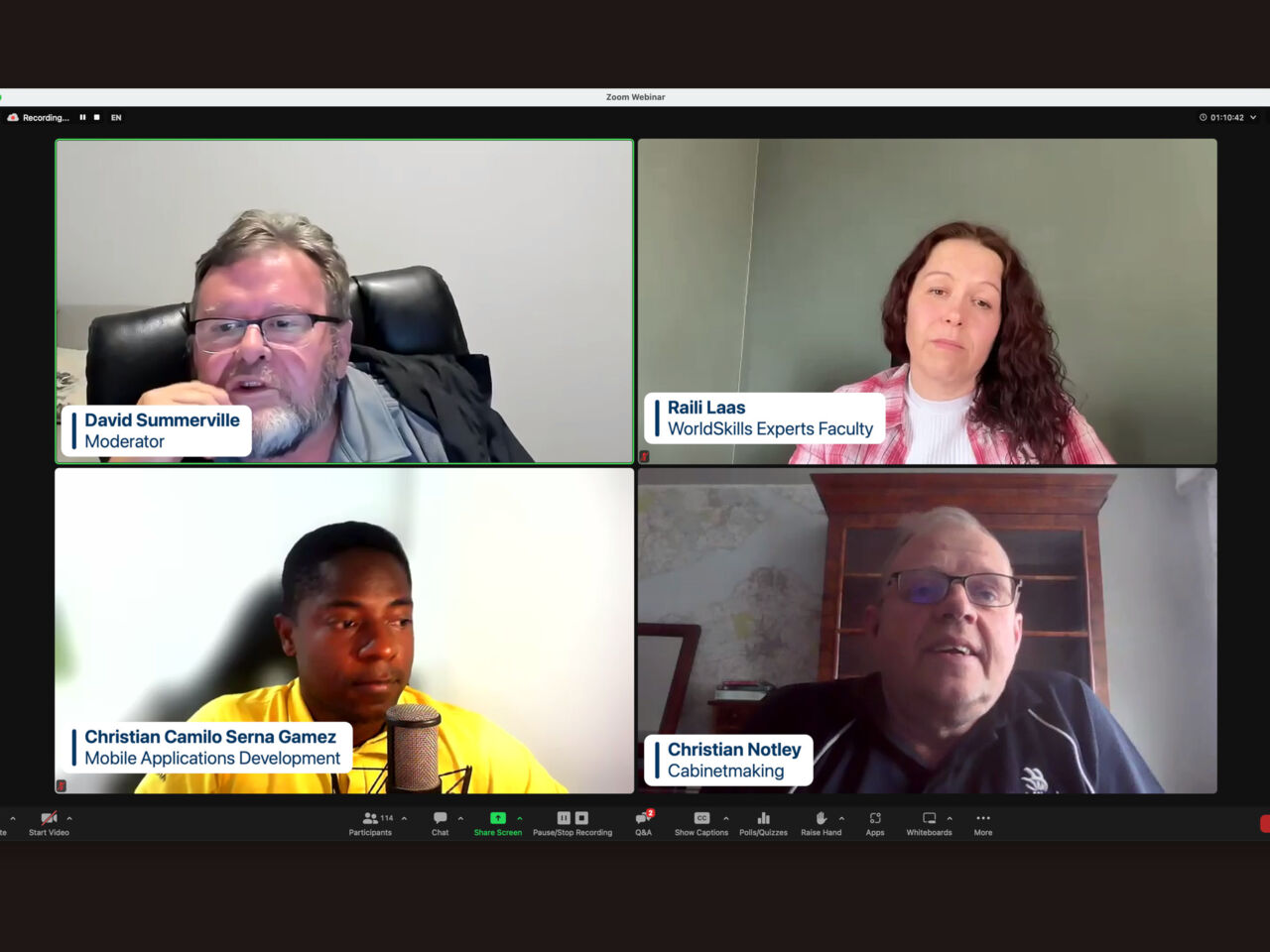13 May 2024
Experts share the impact of Competitions on training and teaching
WorldSkills Expert Faculty hosted a third webinar on the training techniques and the transformative benefits of WorldSkills Competitions in their practice and systems.

The third edition of the WorldSkills Experts Faculty webinar series was successfully hosted on 10 April 2024, as a panel of three Experts from different sectors answered questions about the need and their passion for skill development.
Moderated by David Summerville, Skill Advisor for Information and Communication Technology at WorldSkills Lyon 2024, the panel of Experts included:
- Raili Laas, Experts Faculty representative for Construction and Building Technology
- Christian Camilo Serna Gamez, Expert Lead in Mobile Applications Development
- Christian Notley, Chief Expert in Cabinetmaking
During the webinar titled Unlocking Excellence: Training Techniques and the Transformative Benefits Experts Bring Back from WorldSkills Competitions, Experts talked about their experiences, while also highlighting the influence WorldSkills had on their teaching methodologies and how it helped them evolve as practitioners back home.
Discussing the WorldSkills Competition, all panelists agreed that the journey had been beneficial to both their professional as well as personal growth, and for the young people they have trained.
“My experience at the WorldSkills Competition has been immensely rewarding,” stated Christian Camilo Serna Gamez, from Colombia. “The Competition promotes an environment of innovation, collaboration and excellence, allowing Competitors to push their boundaries,” he said, adding that, “all of us who participate in this Competition learned day by day and improved our techniques and skills.”
Gamez also stated that the techniques he learned during the WorldSkills Competitions helped him train his students in Colombia. He spoke about the importance of micro-learning, which consists of focusing on particular aspects of larger, more complex topics and technologies to enhance students’ understanding and competencies.
He says he has also integrated this system in his classrooms through “customized learning modules” and implemented changes in his institute’s curricula, with Competitors and students adopting this concept to learn much faster.
Speaking about the international exposure provided by WorldSkills Competition, Raili Laas from Estonia said, “The experience has been very interesting, as it helps you learn about the world. The event helped us understand the trends in landscape gardening, as well as the different types of materials used around the world.”
Laas said that the Competition also helps participants “learn from each other as a person and as a trainer,” while also adding that her work on developing and updating the WorldSkills Occupational Standards has allowed her to collaborate with different kinds of people.
On the same line, Christian Notley said, "While every Competition is different, one thing that struck me right from the beginning was the different approaches each of the Competitors and Experts would take to achieve the same result. Depending on where the participants are from, they have different ways of resolving the same problems.”
Stating a particular example from Cabinetmaking, he said, “How we would make a particular joint, that is traditional in United Kingdom, but you take it for a Japanese Competitor, and they have a totally different approach to get the same result. Seeing different cultures, different countries, enriches your own growth professionally and personally as well. And it’s just interesting to then take those ideas back and try and apply them in your own training.”
These cultural and traditional variations that characterize the trade of Cabinetmaking, means there is variation in training and standards within the profession. The WorldSkills Occupational Standards are therefore an opportunity to set and recognize them, which he has eventually taken to his home country.
“I pulled those standards back into my regional national qualification and into the training. And one of the ways I’ve done that is I’ve been greatly dependent upon other Experts in the field who are past Competitors”, said Notley.
He also added that he has become an advocate within training in colleges and training centres around the country, taking the ideas from the WorldSkills Competition and implementing them in his classrooms, where the students have never competed against anyone before.
Using Test Projects for teaching and assessing students is one of the key training techniques that Laas adopted from her experiences in WorldSkills Competitions. Test Projects describe the work Competitors undertake at the WorldSkills Competition to demonstrate occupational excellence. This way, she said, “the focus was not just on individual components, but on integrating them into a complex, complete project.”
“This significantly enhanced our Landscape Gardening education in Estonia, because we are a small country, so it’s easy to have an impact.” She added that “the impact was significant because it didn’t come only from my perspective, but it was from the practice and standards from the skills, Experts, and WorldSkills generally, along with competitions worldwide.”
The webinar ended with an interactive 30-minute Q&A session, where viewers could comment at the bottom of the screen and their questions were then answered by the panel of Experts.
The next webinar in the series is planned to take place during the month of July, under the title “Are you ready for WorldSkills Lyon 2024? A review of your preparation for the Competition”. This webinar aims to provide an overview of the most essential elements of Competition preparation for Experts.